Here is our list of management science books.
Management science books are guides, reference materials, and textbooks that use scientific methods to solve complex management issues. Examples of management science books are Introduction to Management Science by Bernard W. Taylor III and The Tyranny of Metrics by Jerry Z. Muller. The purpose of management science books is to provide leaders with a decision-making framework based on analysis, data, and mathematical models. The techniques covered in management science books offer a structured approach to decision-making in management.
Management science books are similar to office management books, training and development books, and operations management books. These resources help readers learn about management tips, management styles, and management by objectives.
This list includes:
- management science books for beginners
- management science textbooks
- best selling management science books
Let’s begin!
List of management science books
Management science books help readers develop problem-solving and critical-thinking skills essential in management. Here is a list of books you should consider reading to develop your management science techniques.
1. Introduction to Management Science (What’s New in Operations Management) by Bernard W. Taylor III

Introduction to Management Science is one of the management science textbooks that provides a comprehensive introduction to the topic. Bernard W. Taylor III adopts a clear and concise writing style in this book, making it easy for beginners to learn. Readers will find information on linear programming, decision analysis, network models, and simulation. For beginners with little or no experience dealing with uncertain situations, this book includes a chapter on decision-making under uncertainty. Also, the book includes end-of-chapter problems and exercises that allow readers to test their understanding of each section. By building on concepts and techniques as the book progresses, Taylor presents the book in a logical sequence.
Notable quote: “A management science solution can be either a recommended decision or information that helps a manager make a decision.”
Check out Introduction to Management Science.
2. Small Giants: Companies That Choose to be Great Instead of Big by Bo Burlingham

In Small Giants, Bo Burlingham explores the processes of 14 great private companies, including a record label and a brewery. Burlingham debunks the idea that all successful businesses need to go the extra mile to prioritize growth. Instead, companies can focus on providing excellent customer service and building a sustainable culture over rapid expansion.
This book examines how these organizations worked hard and smartly to satisfy business goals. By providing a new and inspirational guide to business and management strategy, Burlingham shows the readers the magic ingredients that made all these companies unique and successful.
Notable quote: “If you constantly hear about the need to grow or die, if everybody seems to be trying to get to the next level, if the only companies being celebrated—or even taken seriously—are the biggest, you may never even think to ask about options other than growing your business as much as you can and as quickly as you can.”
Check out Small Giants.
3. What Your Employees Need and Can’t Tell You: Adapting to Change with the Science of Behavioral Economics by Melina Palmer
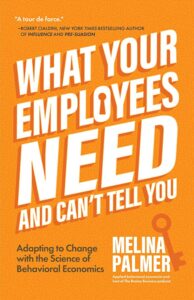
What Your Employees Need and Can’t Tell You provides insight into understanding the impact of behavioral economics on management practices. Melina Palmer explores frameworks for understanding employees’ responses to change. This book touches on three major themes, including understanding how the brain works when faced with change, concepts the subconscious brain uses in decision-making, and applying the book’s knowledge. Readers will also learn strategies for employers to engage with employees effectively.
Notable quote: “If you approach change properly, it can be quite easy. People naturally and happily embrace change all the time, but we tend to ignore its signs.”
Check out What Your Employees Need and Can’t Tell You.
4. Leadership and Management Development by Jeff Gold, Richard Thorpe, and Alan Mumford

In Leadership and Management Development, Jeff Gold, Richard Thorpe, and Alan Mumford provide strategies and advice for effective management and leadership practices. The authors use research from psychology, organizational behavior, and sociology to share insights on leadership. The updated edition covers a broader area of ethics, ecology, SMEs, and diversity. By presenting more international examples, this book is ideal for readers studying leadership and management development as part of a CIPD qualification.
Notable quote: “Through talk, argument, and persuasion, a manager creates meaning with others, providing clarity as the conversations unfold.”
Check out Leadership and Management Development.
5. Business Analytics: The Art of Modeling with Spreadsheets, 5th Edition by Stephen Powell and Kenneth Baker

This book by Stephen Powell and Kenneth Baker uses Excel spreadsheets to teach the principles of management science. The Art of Modeling with Spreadsheets focuses on optimization, data visualization, simulation, and regression. This fifth edition covers management science, modeling craft, and spreadsheet engineering. The book provides readers with the skills and technical knowledge necessary for business modeling. The Art of Modeling with Spreadsheets is brief and accessible, making the book suitable for departments or courses with modeling as a critical skill.
Notable quote: “Models are not useful only in the business world, but also in the academic world where business analysts are educated.”
Check out Business Analytics.
6. The Tyranny of Metrics by Jerry Z. Muller
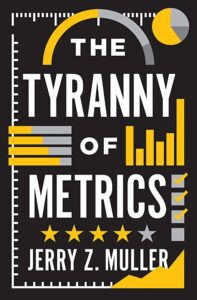
The Tyranny of Metrics is a management science book that examines how performance measurement and metrics influence decision-making and organizational behavior. Jerry Z. Muller touches on how metrics inform performance improvement and accountability. However, it is possible to misuse these metrics with unintended consequences. The Tyranny of Metrics adopts an interdisciplinary approach by drawing insights from history, psychology, sociology, and political science. With this approach, Muller provides a holistic understanding of the subject matter. Each chapter builds on the previous one to help lead a compelling and coherent argument.
Notable quote: “When numbers, standardized measurement of performance, and big data are seen as the wave of the future, professional judgment based upon experience and talent are seen as retrograde, almost anachronistic.”
Check out The Tyranny of Metrics.
7. Leading for Change: How to Thrive in Uncertain Times by Kathryn Simpson

Leading for Change is among the best selling management science books that help leaders navigate change and uncertainty. Being a leader in a constantly evolving business management environment can be daunting, especially in carrying the whole team along on the journey. To address this challenge, Kathryn Simpson explores eight success factors to help all leaders create a pathway. In this book, readers will understand how to lead change effectively, implement approaches to engage stakeholders, and create a sustainable success pathway.
Notable quote: “As a leader, it is important to understand your role—when you are going to be a content expert (someone who knows what needs to be done) or a facilitator (who focuses on how the work needs to get done), or a combination of both roles.”
Check out Leading for Change.
8. A Guide to the Project Management Body of Knowledge by The Project Management Institute
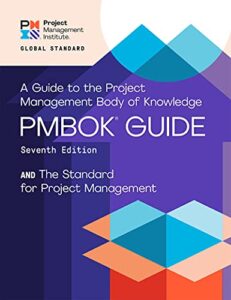
A Guide to the Project Management Body of Knowledge provides a detailed framework for project management by outlining the procedures and processes required for successful project delivery. The book covers monitoring, control, execution, and project planning. In addition, readers will gain insights into project communication, stakeholder management, and risk management.
Also, A Guide to the Project Management Body of Knowledge helps readers evaluate and assess project performance. Then, readers can use the information to make necessary improvements and adjustments. In return, you can deliver projects on time, within the stipulated budget, and to the required standard. The Project Management Institute updates this book annually to reflect the latest industry best practices. As a result of this update, the book remains valuable and relevant for project managers.
Notable quote: “Project managers are expected to deliver projects that create value for the organization and stakeholders within the organization’s system for value delivery.”
Check out A Guide to the Project Management Body of Knowledge.
9. High Output Management by Andrew Groove
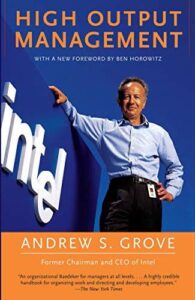
In High Output Management, Andrew Groove discusses managing a new business effectively. By focusing on the role of a manager in organizational success, Groove emphasizes the importance of goal setting and providing feedback to employees. Groove also stresses the need for proactiveness and anticipating problems before the problems arise. With an emphasis on data-driven decision-making, High Output Management encourages managers to gather data and use it to make informed decisions about the teams and organization. In today’s age of big data, an emphasis on data and analysis is essential. The ideas in this book are great for professional and aspiring managers, accountants, consultants, CEOs, and teachers.
Notable quote: “When products and services become largely indistinguishable from each other, all there is by way of competitive advantage is time.”
Check out High Output Management.
10. The Making of a Manager: What to Do When Everyone Looks to You by Julie Zhuo

The Making of a Manager provides practical insights into the challenges of being a manager and how to navigate these challenges successfully. The book focuses on essential areas in management, such as decision-making, communication, hiring, and managing staff. In each chapter, Julie Zhuo shares personal stories and actionable tips for new and aspiring managers. Zhuo emphasizes creating a positive workplace culture and building strong employee relationships. This approach fosters innovation and creativity while improving employee morale and retention. With Zhuo’s conversational and engaging writing style, the book is easy for readers to digest and apply daily in their work lives.
Notable quote: “The management aspect has nothing to do with employment status and everything to do with the fact that you are no longer trying to get something done by yourself.”
Check out The Making of a Manager.
11. Project Management for the Unofficial Manager by Kory Kogan, Suzette Blakemore, and James Wood

Project Management for the Unofficial Manager is suitable for readers without formal training in project management but who have to manage projects in various roles. This book covers topics around the entire project lifecycle, from project initiation to closure, risk management, scope management, and stakeholder management. In addition, the book provides tips for handling project communications and managing virtual teams. Project Management for the Unofficial Manager adopts five components to help readers manage and take charge of projects. These components include initiation, planning, execution, monitoring, and closing. With this book’s detailed and step-by-step procedures, any reader can successfully manage a project from start to finish.
Notable quote: “If most of your work time is spent on projects and you have never been exposed to formal project management training, you are an unofficial project manager.”
Check out Project Management for the Unofficial Manager.
12. The First-Time Manager by Loren Belker, Jim Mccormick, and Gary Topchik
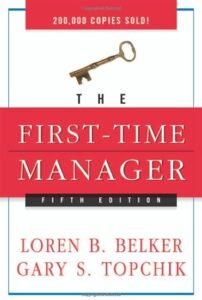
Transitioning from an employee to a manager can be daunting, so The First-Time Manager is an excellent read for new leaders. Loren Belker, Jim Mccormick, and Gary Topchik help readers set necessary boundaries and decide what type of manager readers want to be. This book focuses on motivation, remaining calm under pressure, listening, hiring, and leading meetings. The First-Time Manager touches on tackling every possible management problem. Also, the book is action-oriented and comes with checklists, exercises, and templates to help readers apply the techniques in their work.
Notable quote: “Being a manager requires skills beyond those of being an excellent technician. Managers need to focus on people, not just tasks. They need to rely on others, not just be self-reliant.”
Check out The First-Time Manager.
13. The Effective Executive: The Definitive Guide to Getting the Right Things Done by Peter Drucker
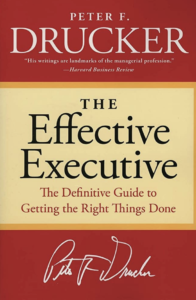
The Effective Executive offers practical advice on improving effectiveness as a manager and leader, focusing on prioritization and decision-making. Peter Drucker is one of the most influential thinkers in management science and offers practical insights in this book. Drucker emphasizes the fundamentals of effectiveness. These fundamentals include focusing on results rather than activities, concentrating on essential tasks, making effective decisions based on data and analysis, and taking responsibility for communication with others. In addition, Drucker believes being an effective executive is about getting the right things done, which involves avoiding what is unproductive and doing what others overlook.
Notable quote: “Intelligence, imagination, and knowledge are essential resources, but only effectiveness converts them into results.”
Check out The Effective Executive.
14. New Managers: Mastering the Big 3 Principles of Effective Management—Leadership, Communication, and Team Building by Paul Falcone
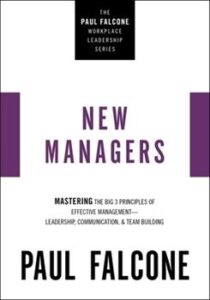
In this book, Paul Falcone provides new managers with the essential skills to thrive in management roles. New Managers focus on leadership, communication, and team building principles. Falcone believes that being a good manager is not a natural skill. However, one can learn how to create an environment that amplifies all employees’ skills while developing a solid team. Also, the book breaks down significant aspects new managers struggle with the most and provides actionable solutions.
Notable quote: “You need to not only manage performance but also demonstrate the soft skills of listening, empathy, and genuine concern for your employees.”
Check out New Managers.
15. The 80/20 Principle: Achieving More with Less by Richard Koch

The 80/20 Principle is among the best management science books for beginners. The 80/20 principle states that 80 percent of your results come from 20 percent of your efforts. Richard Koch adopts this principle in this book to reveal how to increase effectiveness and improve your career. Koch teaches concentrating on those little activities to unlock more significant results. The key is to channel your efforts toward identifying the tasks that lead to the most effective outcomes.
Notable quote: “Everything in life is a tussle between effort and results, inputs and outputs, causes and consequences.”
Check out The 80/20 Principle.
Conclusion
Management science books are relevant in various fields, including business, healthcare, government, and engineering. These books help decision-makers and managers make effective and informed decisions. By providing practical examples and case studies, management science books help develop readers’ critical thinking and problem-solving skills and drive success in the business environment. A management science book is suitable for every reader regardless of professional status, from introductory to more advanced.
For more management resources, check out these articles on management training programs, project management skills, and management podcasts.
